
The Sheldrick Wildlife Trust Mau De-Snaring Unit celebrates their one-year anniversary this quarter and Mara Elephant Project wanted to highlight the impact this permanent ranger unit has had in the critical habitat of the Mau Forest.
General Mau Forest Information/Background:
The elephant carrying capacity of forests in Kenya is heavily threatened by anthropogenic pressures (i.e. land encroachment for settlement and forest degradation through grazing, fires, illegal logging for timber, charcoal and firewood, and wildlife poaching). Although forests may contain a quarter of Kenya’s total elephant population, knowledge on the status of forest-dwelling elephant in Kenya is outdated and of poor reliability (Thouless, 2016). The Mau Forest complex forms the largest canopy forest ecosystem in Kenya and is the single most important water catchment in the Rift Valley and western Kenya.
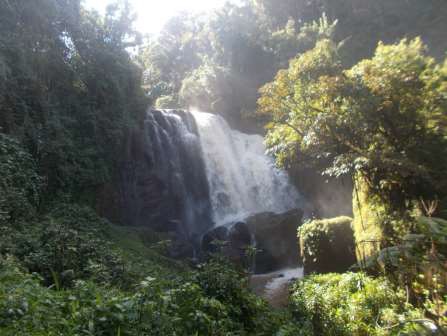
Estimates in 2016 state that the 0.45 elephants/km2 represents 652 elephants restricted to the “elephant block” which comprises around 1,458 km2 of the south western Mau, Trans-Mara, Ol Pusmoru and Maasai Mara blocks. Current management policies are insufficient to protecting the Mau Forests complex and urgent action is required to stop the loss of elephants and other wildlife and the destruction of the forests.
Team Background and Objectives:
In response to this the Sheldrick Wildlife Trust (SWT) and Mara Elephant Project (MEP) established a permanent ranger unit in January 2018 in the Mau Forest to protect elephants and other wildlife and the habitat upon which they depend.
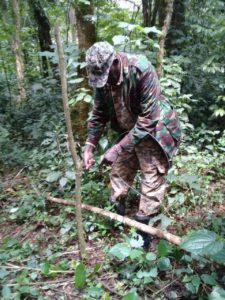
In order to achieve this in the Mau Forest, SWT supports a team consisting of MEP, Kenya Wildlife Service, Kenya Forestry Service and Narok County Government rangers all based in the Mau Forest at Emitik outpost. This team’s objectives include conducting regular patrols to monitor elephants and provide rapid response to safeguard elephants and other wildlife from poaching and human-elephant conflict. These activities include taking down snares (pictured left), rooting out illegal poaching and logging operations, intervening in human-elephant conflict situations and fostering positive community relations. The SWT Mau De-Snaring Unit patrols the forest for 20-days at a time each month based on the operational orders of MEP and areas previously covered, local intelligence, and the movement data of the two collared elephants in the area will help inform these orders.
In June, the SWT Mau De-Snaring Unit split into two units to focus on two main areas: the Bondet/Olpusumoru forest block and the Olenguruonge/Emitik forest block (pictured below). In total there are 13 rangers that make up both teams and the Sheldrick Wildlife Trust provided funding for the establishment of this team and their permanent presence is paramount to protecting the elephant population in the Mau Forest currently estimated at 652 down from 1,003 in 2005 and already in the in the first year of operation, they’ve had many great successes. Month-By-Month Successes:
Month-By-Month Successes:
In January, the team had its first arrest of one suspect with a yellow backed duiker that he had killed using a snare, they also confiscated a total of 43 snares. While snares are hazardous to elephants, they are also used to catch animals often sold for illegal bush meat like duiker, giraffe and the endangered mountain bongo antelope.
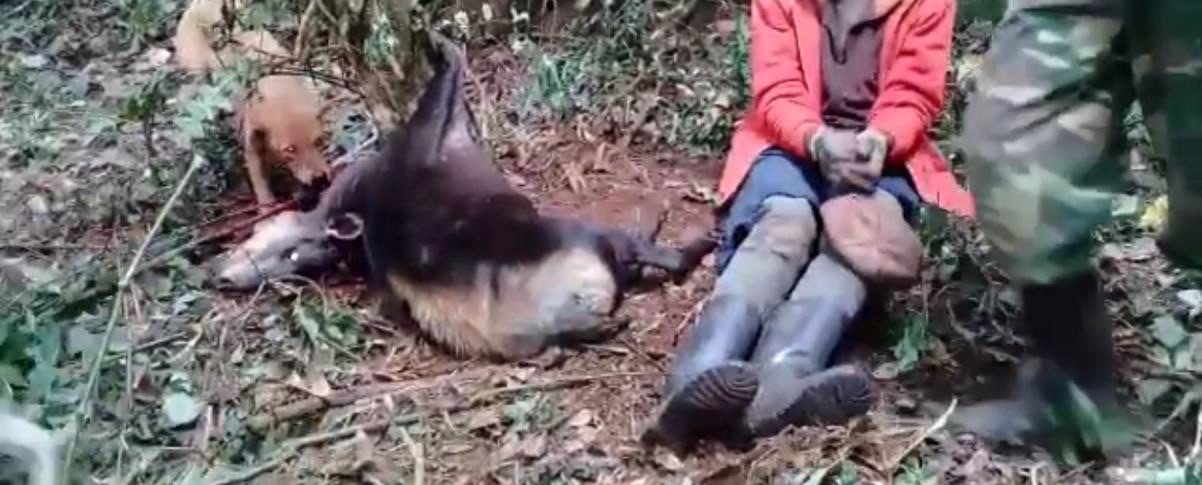
The arrest of one suspect took place on January 20 in possession of a yellow backed duiker and 43 snares.
In February, there were reports from the SWT Mau De-Snaring Unit of increased poaching activity in the forest. In response to this increase, MEP deployed an intelligence unit and rapid response unit to the forest to assist. The SWT Mau De-Snaring Unit arrested two suspects with a cross cutter, 16 posts (illegally logged wood) and 60 snares.
 In March, the SWT Mau De-Snaring Unit continued to recover snares and poison-tipped drop spears that were being used in the forest for bush meat poaching and to kill elephants. The ongoing elephant poaching in the Mau Forest is evident by the recent carcasses the rapid response unit found (pictured left). As a result of the increased poaching and elephant deaths, the team held two community meetings on the forest’s edge where they informed the community about the poached elephants nearby and encouraged open communication between them and the SWT Mau De-Snaring Unit in order to address the poaching issue. Also, during this month, the team destroyed two kilns used for illegally making charcoal in the forest.
In March, the SWT Mau De-Snaring Unit continued to recover snares and poison-tipped drop spears that were being used in the forest for bush meat poaching and to kill elephants. The ongoing elephant poaching in the Mau Forest is evident by the recent carcasses the rapid response unit found (pictured left). As a result of the increased poaching and elephant deaths, the team held two community meetings on the forest’s edge where they informed the community about the poached elephants nearby and encouraged open communication between them and the SWT Mau De-Snaring Unit in order to address the poaching issue. Also, during this month, the team destroyed two kilns used for illegally making charcoal in the forest.
In March and April, the SWT Mau De-Snaring Unit rangers all received formal basic, medical and tactical training at MEP HQ. They all passed with flying colors in April and their graduation ceremony at the Emitik Forest Station had a good turnout from the community with over 500 people in attendance including the Narok County Government, Kenya Wildlife Service, police and local administration.
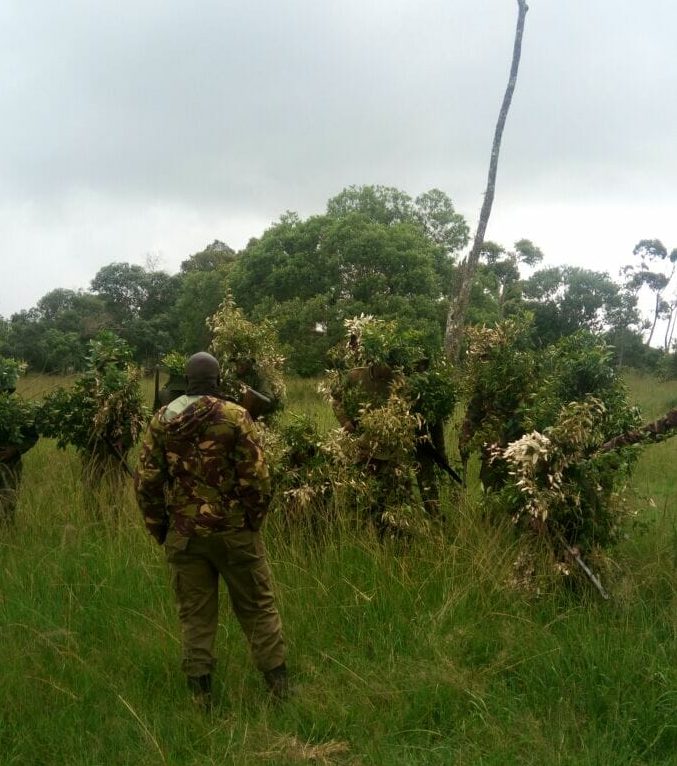
Training that took place at MEP HQ in April.
In May, the team received their new Sheldrick Wildlife Trust Land Cruiser which officially meant the team was fully equipped, trained and had a dedicated vehicle. Additional successes included the arrest of one suspect who was illegally logging in the forest and the recovery of 90 posts. In addition, they recovered a total of three spears, 10 snares, two illegal bushmeat skins and two axes.
In June, the team split into two to cover a larger area in response to the amount of illegal logging and poaching being found in the forest. June was busy with the arrest of one poacher with dik dik meat, the recovery of six sacks of charcoal as well as destroying one kiln. The team also recovered eight snares and two poisoned spears as well as one bush buck skin. Finally, in June, the team arrested four suspects for illegal logging in the forest.
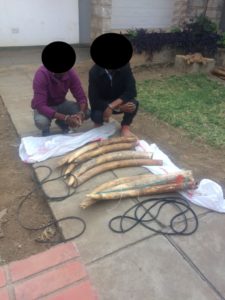
In July, the team focused their patrols on de-snaring, shutting down illegal logging and poaching sites and rooting out poachers. On July 6, they recovered three snares. On July 15, the MEP intelligence unit with the help of the SWT Mau De-Snaring Unit recovered 37 kg of ivory and arrested two suspects (pictured left). On July 19 & 20, the team was elephant tracking and de-snaring and took down a total of 37 snares in one day. Between July 18 and 20, the team recovered a total of 46 snares. On July 21, the team shutdown a poacher’s camps where they were producing illegal charcoal and confiscated 26 bags of charcoal, destroyed two kilns and the remaining bush meat found. On July 22, the team shutdown two poacher’s camps and recovered 20 bags of charcoal that were packed for transport. Finally, on July 24, the team arrested a total of four suspects, recovered 22 snares, destroyed two kilns, bushmeat and four sacks of charcoal all found in two poacher’s camps.
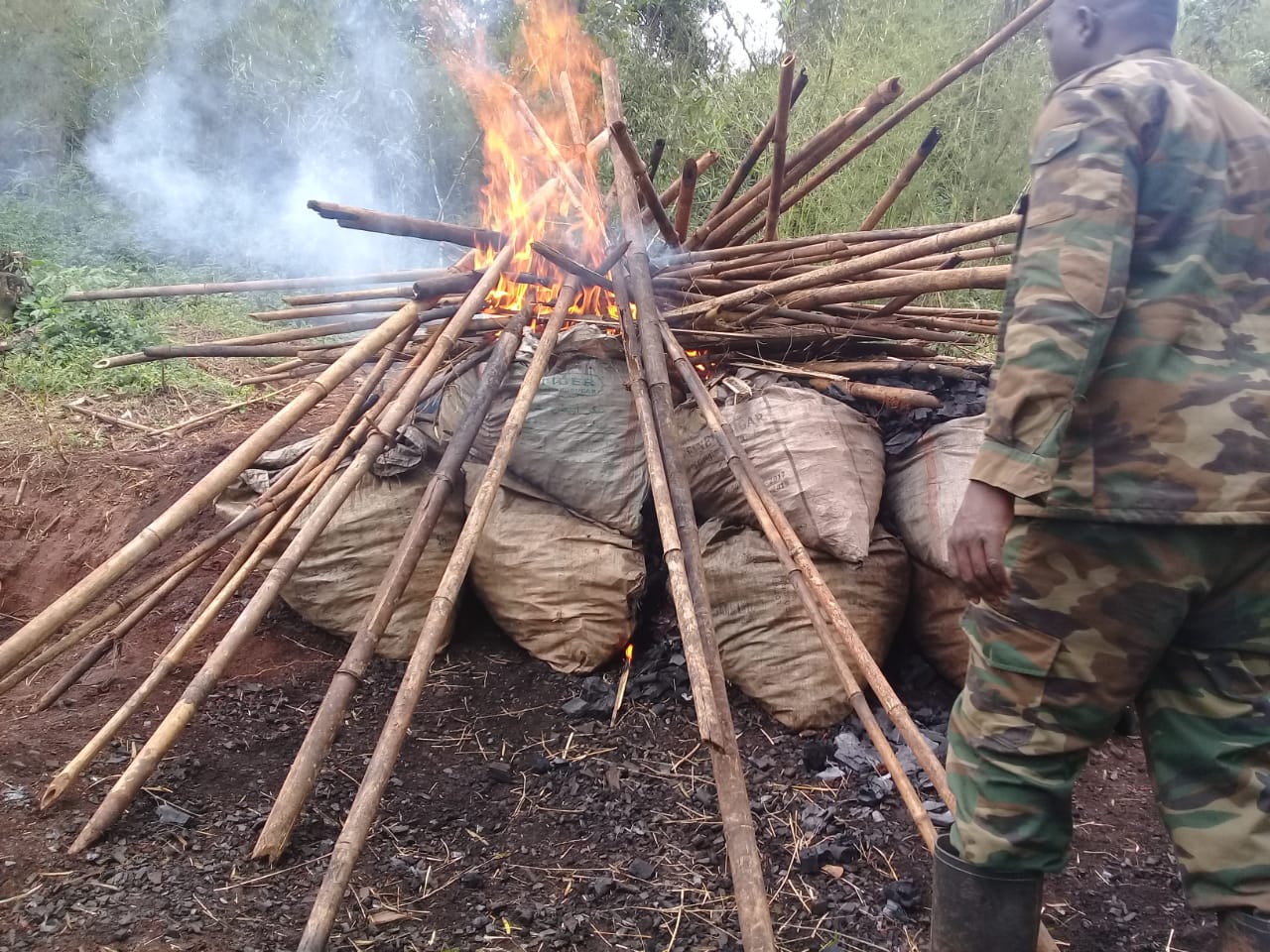
On July 22, charcoal being destroyed after being confiscated in the Mau Forest.
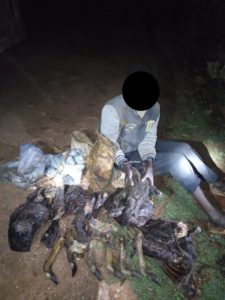 In August, the team removed 23 snares and in September they removed 25 snares all intended to poach small animals to be used for bushmeat. In September three suspects were arrested by KWS based on MEP intelligence: one suspect had 4 kg of ivory that was seized and two suspects in possession of a total of 21 kg of bushmeat (pictured right).
In August, the team removed 23 snares and in September they removed 25 snares all intended to poach small animals to be used for bushmeat. In September three suspects were arrested by KWS based on MEP intelligence: one suspect had 4 kg of ivory that was seized and two suspects in possession of a total of 21 kg of bushmeat (pictured right).
Illegal logging has been a big issue in the Mau Forest and in October two suspects were arrested for cutting down trees inside the forest. In addition, in November, three suspects were arrested in possession of cedar posts from the Mau Forest and two pit saws were confiscated. In November, 59 total snares were taken down and in December, 12 snares were confiscated by the Mau team. Finally, in December, the Mau team destroyed three kilns, confiscated seven sacks of charcoal and destroyed two poacher’s houses.
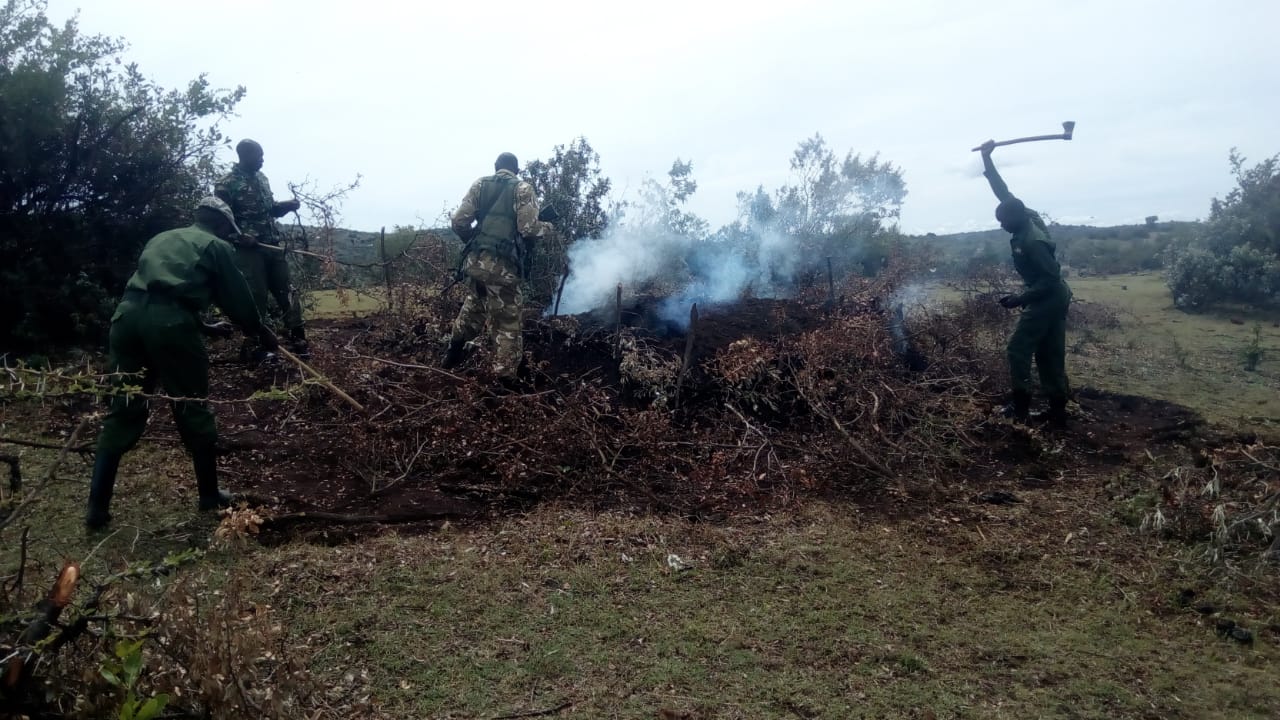
A kiln being destroyed by rangers on December 12.
This is a granD total in 2018 of 24 suspects arrested, 10 kilns and four poacher’s camps destroyed. The recovery of 41 kg of ivory, two pit saws, two poison spears, one cross cutter, five spears, two axes, 57 sacks of charcoal. Attributed to this team is the collection of 88 illegal log posts and four skins and the shutting down of four illegal logging sites. Finally, the SWT Mau De-Snaring Unit removed a total of 311 snares from the Mau Forest in 2018.
We are pleased to say that the Sheldrick Wildlife Trust has agreed to support this team’s efforts in 2019 and our goals are to increase communication with Kenya Forestry Service and the community forest associations set up along the forest boundary to stop illegal activities inside the forest. The focus will continue to be on wildlife crimes and helping stop the illegal logging that’s rampant in the forest by arresting loggers and confiscating their equipment. We are also committed to investigating potential income generating activities for the people that live along the forest edge which keeps people out of venturing into the forest. Finally, in 2019, we are planning for all MEP commanders to attend a commanders training course during 2019, which will include one person from the Mau team. If you’d like to support any of these activities, please contact us here.



